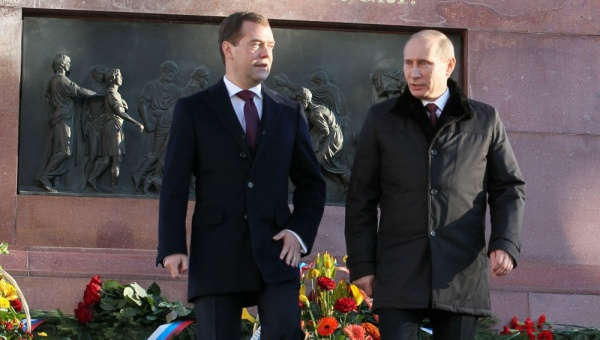Feng Shaolei: Vladimir Putin is the leader who actually leads Russia
Source: Wahl international debate club official website
Reprint link:http://valdaiclub.com/politics/34480.html
Feng Shaolei: Vladimir Putin is the leader who actually leads Russia
Valdaiclub.com interview with FENG Shaolei, participant of the VIII summit of the Valdai International Discussion Club, Dean, School of Advanced International and Area Studies (SAIAS), East China Normal University; Director, Centre for Russian Studies, East China Normal University.
Do you think that the proposal that Dmitry Medvedev and Vladimir Putin swap posts as President and Prime Minister will help the United Russia party win the 2011 parliamentary election and the 2012 presidential election?
Generally speaking, I take a positive view of the possibility that United Russia will win at the 2011 parliamentary election for several reasons. First, the proposed Medvedev-Putin swap will greatly benefit the election. Second, Medvedev and Putin together represent a wider range of mutually complementary constituencies.
Obviously, competition on the current Russian political scene is quite fierce. However, United Russia has been directly supported by Putin for many years and still has a relative advantage. Moreover, the establishment of the Popular Front will also play an important role in the upcoming election.
Taking a different perspective, Putin has repeatedly stressed that reform and innovation should be strengthened for the sake of the party’s future development, which in turn brought people hope. As for the future political course, the party will not only pursue stability but will also inspire people to participate in politics and innovation to a greater extent.
What impact could this decision have on Russia’s political system?
First, I think Putin is the leader who actually leads Russia – promoting modernization and offering guidance in all respects. So, the swap is just a change from what is, in fact, today’s reality to a situation where this reality has real political status supported by voters and the Constitution. This corresponds to the country’s organic path of socio-historical development.
Second, Russia’s development this century has so far indicated that Putin’s political line is in touch with reality and has therefore gained continuous support from most residents. As a result, it is reasonable to expect the political system to be more effective and more equitable going forward.
Third, political cooperation between Putin and Medvedev is a rather rare political arrangement in the European political history. This is an unprecedented scenario, and therefore it is only natural that many initially find it something that is difficult to accept or recognize. However, taking the long view, it may prove to be a valuable initiative for practical political development in global terms.
Will Russia’s modernization policy continue after 2012?
The modernization policy is supported both by Putin and Medvedev. Due to the particular division of roles between them, Putin places greater emphasis on economic modernization while Medvedev is more focused on political modernization. These two are, in fact, inseparable. Consequently, once Putin has been elected president in 2012, it is reasonable to expect that these two aspects of modernization will continue to be coordinated.
Theoretically, I do not believe that political modernization can be pushed forward in isolation from economic modernization. Thus, if Putin is elected president again, he will most likely be in a better position to promote interaction between political and economic modernization more effectively.
In the long run, it will be a positive and precious opportunity for the Russian population.
Do you think China could become a key partner in supporting this modernization strategy?
Viewing the China-Russia relationship through the “modern partnership” prism, it will be a demonstration of keeping pace with the times.
In recent years the emphasis placed on the China-Russia strategic partnership reflects each of the two countries’ focus, as they compose their own development strategies. The term “strategic partnership” means a stable one that the two countries can trust, rely on and which enables them to support each other on major internal and external strategic issues, sharing a common goal, over a relatively long period.
Now when we use terms like “modernization partnership” I believe the main emphasis is on the fact that, after a lead-in period, we have formed a strategic vision of the future. The next stage will be addressing issues of how to implement and put this strategic thinking into practice. Therefore, I believe that China certainly can and should become a reliable partner for Russia during the modernization process, and vice versa.
How would you characterize, overall, the future of Russia-China relations after the 2011-2012 elections in Russia?
I believe we will see a new phase start, in which China and Russia may deepen their modernization cooperation. This stage will be based on the premise that Russian politics already contains the potential for long-term stability, while Russia takes an active cooperative role in Asia-Pacific affairs. In addition, the recent heated debate over issues of developing and opening-up the Far East and Siberia give us a clearer picture of a scenario in which Russia takes an active participatory role in East Asian cooperation, including through external cooperation along other vectors.
In my opinion, a growing East Asia, especially China, will prove a reliable support for Russia’s future development in this region.
It can even be said that the historic convergence of these two aspects – namely these important changes on the Russian side and continuing growth in East Asia (including China) – presents a rare opportunity. There is every expectation that it will be put into practice.
China’s urbanization, which may last quite a long time, will require continued domestic demand development and further emphasis on trade balance. China is also willing to become more involved in overseas investment and trade. The current issue is how to enable regions, and even the poorest countries in the world, to gain the maximum benefit from urbanization.
China and Russia, as two closely-linked nations unhindered by geopolitical obstacles, can and should cooperate more intensively.

